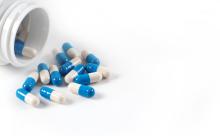Clostridioides difficile (C. difficile)
Clostridioides difficile, often called C. difficile or C. diff, is a type of bacteria that causes diarrhea and inflammation of the colon also called colitis. C. difficile can affect anyone, but those taking antibiotics are most at risk for infection.
The CDC (Centers for Disease Control and Prevention) estimates there are half a million C. difficile infections each year in the United States. Some C. difficile infections can be life threatening.
Most C. difficile infections occur while taking antibiotics or shortly after taking antibiotics. This is because antibiotics can disrupt our microbiome, which is the balance of good and bad bacteria that live in and on our bodies. Having a healthy microbiome is important in protecting against infections. Antibiotics used to fight bacterial infections can sometimes get rid of good bacteria that protect against harmful bacteria, including C. difficile.
Most healthy people who come in contact with C. difficile will not get sick. C. difficile is usually found in the health care environment.
People at higher risk for developing C. difficile infection include people who:
- Have recently taken antibiotics for more than a week.
- Are over the age of 65.
- Had a recent or prolonged stay in a hospital or long-term care facility.
- Have a weakened immune system (such as people with cancer or HIV/AIDS).
- Had a previous C. difficile infection or an exposure to the germs.
C. difficile can be spread through direct contact with someone who has a C. difficile infection or by someone who carries the bacteria but shows no signs or symptoms of infection (called colonization). C. difficile can also spread by touching surfaces or objects, such as medical equipment, that are contaminated with the bacteria. C. difficile is more common in health care settings because many people infected or colonized with C. difficile are staying or being treated in those facilities.
Washing hands with soap and water is the best way to prevent the spread of C. difficile from person to person. In health care settings, health care personnel should use contact precautions to prevent the spread of C. difficile including wearing gowns and gloves. It’s also important to clean surfaces and do laundry frequently to limit the spread.
Symptoms of C. difficile infection include:
- Diarrhea.
- Fever.
- Stomach tenderness or pain.
- Loss of appetite.
- Nausea.
Diarrhea can be a common side effect of taking antibiotics but it is not always caused by C. difficile. However, if diarrhea is severe, seek medical care. Common complications of C. difficile infection include dehydration and inflammation of the colon. Rarely, C. difficile can cause severe complications including serious intestinal conditions, sepsis, or death.
A laboratory test is required to diagnose C. difficile infection. Most people with C. difficile infections require a specific type of antibiotic to treat it.
Some people who are treated for C. difficile infection may become infected again in the next two to eight weeks. The best way to prevent getting C. difficile again is to work closely with your doctor to avoid taking unnecessary antibiotics and to wash your hands with soap and water every time you use the bathroom and before you eat anything. Visit the CDC website for answers to frequently asked questions about life after C. difficile infection.
Resources
- About C. diff?: CDC webpage with general information on C. difficile
- After C. diff: CDC webpage with information about caring for yourself and others after C. difficile infection
Department of Health Services (DHS) resources
- Antibiotic Resistance: DHS webpage with information and resources on antibiotic-resistant organisms
- Antimicrobial Stewardship: Resources for Patients and Health Care Professionals: DHS webpage with information and tools for antibiotic use and prescribing
- C. difficile Infection Patient Education Script for Health Care Workers, P-03729 (PDF): Use this script to provide education on C. difficile infection to patients or residents.
CDC resources for health care professionals
- C. diff Facts for Clinicians: CDC webpage with general information
- Educational resources: Downloadable CDC fact sheets and social media graphics
- C. diff Initiatives: Webpage with CDC goals, strategies, and programs to prevent C. difficile
Questions about C. difficile? Contact us
HAI Website | Phone: 608-267-7711 | Fax: 608-266-0049



